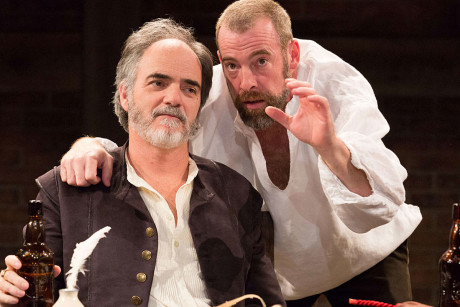
Equivocation. Drama by Bill Cain. Arden Theatre, Philadelphia, 2015
You can judge this play in one of two ways. Perhaps it is the most deeply personal look we’ve ever had of Shakespeare the man, combined with a valuable lesson in English history, an exploration of moral and religious conflicts, and a drama about men’s lives and deaths.
On the other hand, you could see it as a homily with a smart-alecky plot about what-ifs, and dialogue that’s as shallow as the film Shakespeare in Love. The playwright is showing off how much he knows about the subject, but he makes his points and then restates them repeatedly until the audience is exhausted 2 hours and 50 minutes later.
That’s equivocation for you, defined in the dictionary as “ambiguous language to avoid committing oneself.” To be clear, my opinion swayed back and forth during different parts of this extravagantly ambitious work. In the end, I was frustrated by the play while admiring the acting and staging.
History books say that a Catholic named Guy Fawkes, after consultation with a Jesuit priest named Henry Garnet, was found with gunpowder in the basement of Parliament in 1506, intending to blow up the building and kill King James. Then the conspirators would re-establish England as a state loyal to the Pope. Fawkes and Garnet and eight cohorts were hanged.
Playwright Cain wrote in his preface that “the only thing we know with certainty about the event itself is that it could not possibly have occurred in the way the government claimed.” So he says; then he wrote what he calls “a plausible alternative.”
His play presents Shakespeare (whom he prefers to call Shagspeare) as pondering whether he should accept a commission from King James to write a play that gives the king’s version of the Gunpowder Plot. And should Will tell the truth even if that would put people’s lives in danger? Also, whether to turn in one’s friends in order to save your own neck in a time of witch-hunts.
Arthur Miller explored this more successfully in his The Crucible in 1953. Cain may have been hinting at parallels to the U.S. government’s allegation that William Snowden is a guilty of treason. Or, since Cain also is a Jesuit priest, he may just be focusing on the anti-Catholic hysteria in the era of the Tudors.
Now, I’m a history buff, and I appreciate imaginative suppositions based on real events. Itamar Moses’s Bach at Leipzig used history inventively and humorously; other good plays of this ilk include Amadeus, The Invention of Love and The Night Thoreau Spent in Jail. Equivocation is one of the more ponderous attempts in this genre.
The playwright includes myriads of references to Shakespeare’s plays, English history, religion, moral choices, and gossip about leading characters. I’ll cite just one example:
Among scholars of the period, there’s conjecture that King James (the father of English-language bibles) may have had been bisexual. Ben Akerly wrote in The X-rated Bible that “King James’ favorite male lovers were the Earl of Somerset and the Duke of Buckingham.”
This script includes a reference to the king “going off with Buckingham” and later shows King James chasing an actor who’s in drag. But even if the rumors were true, the king’s sexual choices had nothing to do with the action in Equivocation. It’s a distraction that seems there just to titillate.
Cain’s play takes us back to 1606, the third year of the reign of King James. Shakespeare at age 42 (played as a much older-looking man by Eric Hissom) is the most prominent playwright of his time. The king’s henchman, Robert Cecil (Dan Hodge), offers Shakespeare money to write a drama that will promulgate the king’s version of events.
The Bard debates the request and interviews participants to discover what really happened. Eventually he refuses the commission and writes, instead, Macbeth, which was centered on King James’s Scottish ancestors so as to curry favor with the new monarch.
As vividly directed by Terrence Nolen, the play depicts the brutal lengths to which governments will go to investigate acts of supposed treason. Equivocation also is strong in showing the comradery of members of Shakespeare’s company, energetically played by Anthony Lawton, Ian Merrill Peakes, Sean Lally and Dan Hodge (doubling roles).
The starkly simple and versatile set is by David P. Gordon.
Cain added a family drama in which Shakespeare regrets the death at age 11 of his son Hamnet while the Bard avoids closeness with Hamnet’s twin sister Judith, played engagingly by Campbell O’Hare. This is touching, and also makes us think about the theme of reconciliation with daughters that permeates Shakespeare’s last plays, The Winter’s Tale, Cymbeline and The Tempest.
Oddly, Equivocation barely mentions Shakespeare’s elder daughter, Susanna, and avoids the much-written-about possibility that Shakespeare himself was a Catholic. In a play centered on the hostility of the crown towards Catholics, that’s a strange avoidance.
Read other reviews on The Cultural Critic